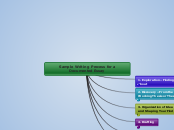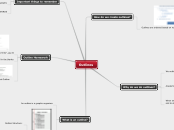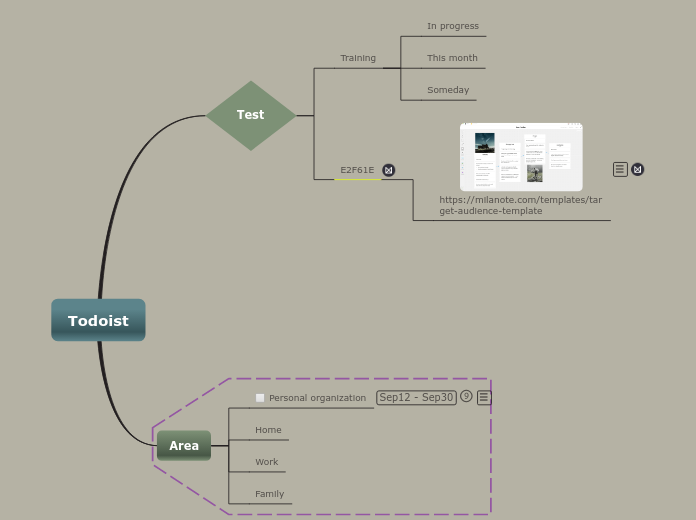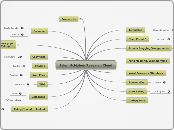Sample Writing Process for a Documented Essay
6. Revising
Mechanics
Physical layout
Citations
Punctuation
Spelling
Style
Tone
Does the tone or voice shift? (examples: first person to second; formal to informal)
Does the writer sound sound pompous?
Does the writing sound too conversational?
Word choice
Is the diction (level of vocabulary) appropriate to the audience?
Are there ambiguous referents?
Are key terms repeated for emphasis?
Are there numerous indefinite pronouns? Ambiguous pronouns?
Are the descriptions appropriate to the topic?
Is the wording precise and concrete?
Sentence flow
Is there a sense of wordiness, such as tripping over long verb or noun phrases?
Are the main ideas of the sentences highlighted? Are the supporting clauses interrupting the idea flow?
Does the reader "gasp for breath" at the end of a sentence?
Are there unintentional rhymes or alliteration that work against the ideas?
Are the sentences appropriately varied?
Organization
Do the paragraphs hang from a clear topic sentence/controlling idea?
Are the transitions present and meaningful?
Does the organization flow as expected?
Content
Is the opposition addressed completely/adequately?
Are all assumptions and logic explicit or directly implied?
Are all claims support and/or qualified?
Is everything true?
Are there enough concrete examples?
Are some details too lengthy or irrelevant?
Is there too much repetition?
Do the readers have all of the needed background?
Start with the big picture, then move to the specifics
5. Reviewing
Consider feedback with an open mind
Review the writing situtation--Rhetorical context--of the assignment
Look at your biases
Ask questions
Take it to the WTC or the instructor
Solicit feedback from readers
See Revising list (Content, Organization, Style, Mechanics)
Have others read it too you
Read it out loud
4. Drafting
plan time to set the draft aside before review and revising
a good first draft will go over the word limit in many cases
not a free-write--on some subjects you may need to express emotion and opinion first, then go back to outlining and drafting
emphasis is on completeness, not perfect prose
first drafts focus on explanation of ideas
3. Organization of Ideas--Learning and Shaping Your Findings
Outlining implies a variety of techniques
Formal sentence and phrase outlines
Work well with formal research papers in APA and MLA
while still flexible, best used after full discovery of ideas
resemble a pre-draft of a paper
subject and verb-based
Topic outlines
good for general planning
noun-based
list ideas and sections
Scratch outlines
road map of reading or writing
descriptive
Verb-based
Cubing
Make a physical, six-side cube
Several variations--most common is
Describe, Compare, Associate, Analyze, Apply, Argue/Debate
Intent is to look at perspectives
Questioning
Also works for Cubing
Who What Where When How Why
Mindmapping
Concept maps
label the connections with arrows in verb terms
Look for connections between ideas and authors
Mindomo
Central idea
branch out to observations
branch out to sources
2. Discovery--From the Topic to the Working Thesis or Thesis Question
This will begin to move to Learning Your Findings (see MindMapping, Questioning, and Cubing techniques)
Keep track of your resources and evaluate them. Try the following techniques:
Keep a running bibliography with a partner(s) and share source evaluations in a lit circle
Compile an annotated bibliography using the same information above
Keep a readers' log of what you are writing
Comment on the following as it applies to your assignment
style of the author--syntax, diction, organization, allusions and figures of speech
context of the publication
obvious or subtle political/social biases or orientations
intended audience
timeliness of the publication
credibility/credentials of the writing and author
relevance to the topic
Summarize the main points within 150-300 words
Create a running bibliography of each reading in MLA or APA format, depending on the assignment
In many cases, allow yourself the freedom to revise your Working Thesis or Thesis question, most often refining it by broadening or narrowing the scope
Use the Working Thesis or Thesis Question to filter your research sources for relevance to the topic
Consult the required resources. These will often include:
Smart web browsing
Videos/documentaries
Books
ebooks
library books, both specialized and general
textbooks
specialized reference texts (such as Gale Virtual Library)
Peer-reviewed or scholarly articles, usually from a database
Convert your topic into a Working Thesis or a Thesis Question
A Thesis Question asks a specific question about the topic that will lead to a conclusion with substance
What is the significance of X to the Y population in the ___ time period? is even better as a Thesis Question because it gives a definable scope to the topic and helps with the manageability of the paper.
What is the significance of X? is better question because it may lead to a claim.
What is X? is not often the best choice of question because it leads more often to a list of facts
A Thesis Question is an alternative to a Working Thesis
A Working Thesis is very much like a hypothesis--this is what you think you will find
A Working Thesis gives shape to your research and refines your thinking
A Working Thesis is often a clunky version of a thesis--it has a WHAT and a SO WHAT
With your topic in hand, make a list of search terms
Use the general sources to compile your list and to make note of potential resources
This is where general secondary resources can help point you in the right direction
1. Exploration--Finding What to Write About
Find a topic
Manageable topics
Make sure you have access to the sources you need
If there are many, many resources, then you may find that your topic is moot, or that you may need to narrow it.
If there are few resources coming up after a good set of search terms are used, you may not have enough to go on.
Do some early hunting and gathering to narrow your topic
Are there enough resources or too many?
If your topic is too grand in scope, you will give an incomplete paper or run long. You may run out of time, which you will need to draft, reflect, revise, and proof your paper
If the resources are specialized, you may have to order them
Keep your time and word count requirements in mind
Relevant topics
Weed out topics that will only lead to a list of facts
Weed out topics that have passed their sell by date, topics that are no longer in dispute or that have recently changed status so that there is not a body of research to draw on.
Scan the following for topic ideas that directly relate to the course goals and outcomes.
Personal connections to the course ideas
Audience/class needs
Specifically local applications of course ideas
Geographical applications of course ideas
Current debates within the field brought up in class
Assignment criteria and objectives
Texts and readings
Lecture notes
The outcomes, of course
Interesting topics
Reply to these ideas with "Yes And" or "No But" angles that take the familiar and change it. Synthesis
When was the class mesmerized by a video?
When was the professor really into a topic?
Review lecture notes/videos
Recall class discussions
What interesting questions arose that people didn’t have answers for?
What topics were talked to death?
Know your audience, as much as is possible
Emotional passion can spell danger
Follow your intellectual passion
If you don’t care, why should we?
Review your assignment carefully









